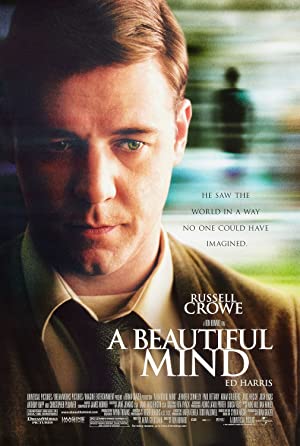
A Beautiful Mind is one of my favorite movies that I would highly recommend to anyone who loves drama and biographical movies. Released in 2001, the movie tells the story of John Nash, a brilliant mathematician who was diagnosed with schizophrenia.
What stood out for me was the way the movie portrayed Nash’s struggles with the illness. From the very beginning, we get to see how his mind works and how he sees the world. The movie also emphasized the importance of Nash’s relationships, especially those with his wife and colleague.
Russell Crowe did an excellent job in his portrayal of Nash, capturing the character’s complexities and nuances with brilliance. Jennifer Connelly was equally impressive as Nash’s wife, Alicia Nash, who played a pivotal role in helping him through his illness and achieving his potential.
The movie’s cinematography was also a standout. The visuals were stunning, and the camera work was exceptional, especially in the scenes that showed Nash’s hallucinations.
Despite being a serious movie, A Beautiful Mind had moments of humor that lightened the mood and made the movie even more enjoyable. The pacing was perfect, and the script was well-written, drawing the viewers in and keeping them engaged throughout the film.
Overall, A Beautiful Mind is a moving story that beautifully depicts the life of a genius who was plagued by mental illness. It’s an inspiring story of overcoming adversity and achieving greatness against all the odds. I cannot recommend this movie enough!
Lesson about A Beautiful Mind
The lesson we can take from the movie A Beautiful Mind 2001 is that even the most brilliant minds can be vulnerable to mental illness.
The Best of A Beautiful Mind
- 1. Accurate portrayal of mental illness: A Beautiful Mind presents a realistic depiction of mental illness, particularly of schizophrenia, through the character of John Nash. The audience is shown how Nash’s delusions and paranoia affected his personal and professional life, illustrating the detrimental effects of untreated mental illness.
- 2. Superb Acting: The film’s lead actor, Russell Crowe, delivers a compelling performance as John Nash, portraying his descent into mental illness with authenticity and depth. Crowe nails the various mood swings and hallucinations in a way that truly immerses the audience and makes for a gripping viewing experience.
- 3. Inspiring Message about Recovery: Despite the struggles and setbacks that Nash faces throughout the film, the movie ultimately delivers a positive message about recovery from mental illness. By the end of the film, Nash is shown to have found some measure of stability and redemption, which serves as a beacon of hope for viewers dealing with similar challenges in their own lives.
Week points of A Beautiful Mind
- 1) One possible weak point of the film A Beautiful Mind is its simplistic portrayal of mental illness. While the movie does raise awareness about schizophrenia and its symptoms, it also simplifies the experience of living with this condition. The film portrays John Nash’s journey as a linear one, with clear-cut solutions and moments of triumph overcome his illness. However, schizophrenia is a complex condition that varies from person to person and often requires ongoing management, therapy, and medication. The movie’s portrayal of Nash’s illness may create unrealistic expectations for those with similar conditions and their families who watch the film.
- 2) Another weakness of the movie is its historical accuracy. While A Beautiful Mind is based on a true story, some critics argue that the portrayal of John Nash’s life is heavily fictionalized. In particular, the film depicts Nash as a paranoid schizophrenic who experiences vivid hallucinations while also serving as a codebreaker for the US government during the Cold War. However, some have questioned the accuracy of this depiction and suggest that Nash’s involvement in classified government work may have been exaggerated for the sake of storytelling. Some critics argue that focusing on Nash’s achievements rather than his lived experience with mental illness further misrepresents schizophrenia and its effects.
- 3) Finally, some argue that the movie A Beautiful Mind reinforces unhelpful stereotypes about mental illness. In the film, John Nash’s illness is portrayed as a result of his exceptional intelligence, a “gift” that also leads to a “curse” in the form of his schizophrenia. This portrayal reinforces the idea that mental illness only affects those who are “different” or “abnormal” in some way. In reality, mental illness can affect anyone, regardless of their intelligence or creative abilities. Additionally, some worry that the movie’s portrayal of Nash’s hallucinations and delusions further stigmatizes those with mental illness as “crazy” or “unpredictable.”
Technical details of A Beautiful Mind
| Title | A Beautiful Mind |
|---|---|
| Year | 2001 |
| Rated | PG-13 |
| Released | 04 Jan 2002 |
| Runtime | 135 min |
| Genre | Biography, Drama |
| Director | Ron Howard |
| Writer | Akiva Goldsman, Sylvia Nasar |
| Actors | Russell Crowe, Ed Harris, Jennifer Connelly |
| Plot | From the heights of notoriety to the depths of depravity, John Forbes Nash, Jr. experienced it all. A mathematical genius, he made an astonishing discovery early in his career and stood on the brink of international acclaim. But the handsome and arrogant Nash soon found himself on a painful and harrowing journey of self-discovery. After many years of struggle, he eventually triumphed over his tragedy, and finally – late in life – received the Nobel Prize. |
| Country | United States |
| Awards | Won 4 Oscars. 37 wins & 69 nominations total |










